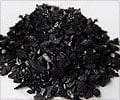Families with higher carbon footprints are likely to consume more confectionary, alcohol, and restaurant food, revealed a new study.

‘Meat consumption could explain less than 10 percent of the difference seen in carbon footprints between Japanese families.’





Instead, households with higher carbon footprints tended to consume more food from restaurants, as well as more vegetables and fish. However, it was the amount of confectionary and alcohol consumption - 2-3 times more than low carbon footprint households - that really stood out. Meat has earned a reputation as an environmentally damaging food, as beef production emits 20 times more greenhouse gases than bean production for the same amount of protein. However, Associate Professor Kanemoto cautions against a one-size-fits-all policy.
"If we think of a carbon tax, it might be wiser to target sweets and alcohol if we want a progressive system," proposes Kanemoto.
Japan's population is one of the oldest in the world, a trend that many industrial countries are following. This suggests that successful policies for dietary change and energy efficiency in Japan could act as models for many countries in the next decade or two. The Japanese also have a relatively healthy diet, which is frequently attributed to them having the world's longest lifespan by country.
"If we are serious about reducing our carbon footprints, then our diets must change. Our findings suggest that high carbon footprints are not only a problem for a small number of meat lovers in Japan. It might be better to target less nutritious foods that are excessively consumed in some populations," believes Kanemoto.
Advertisement
"Meat is a high carbon footprint food. Replacing red meat consumption with white meat and vegetables will lower a family's carbon footprint," he says.
"Due to wealth, culture, and farming practices, different regions in a country consume food differently. Japan alone has prefectures with more than 10 million people and others with fewer than one million," Dr. Reynolds notes. "These regional and income differences in food consumption are also found in the UK, Europe, Australia, and the USA. All countries are facing challenges in how to shift diets to be healthier and more sustainable.
This evidence from Japan demonstrates that research can help us to identify what to focus on. The same patterns of dietary change in terms of sugar, alcohol and dining out need to be considered in the UK, Australia, the US and Europe."
Source-Eurekalert











